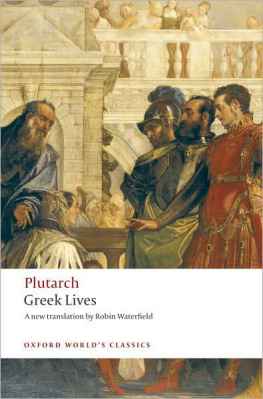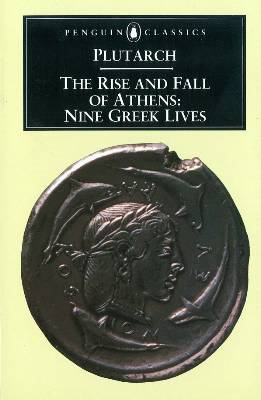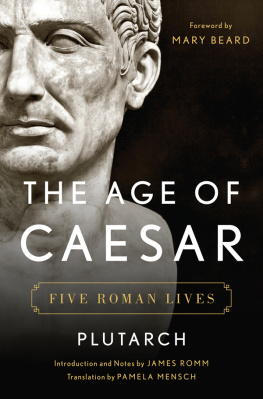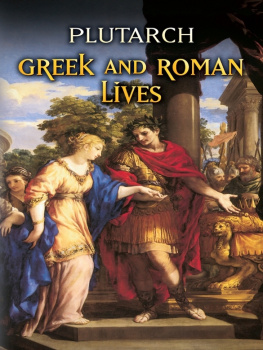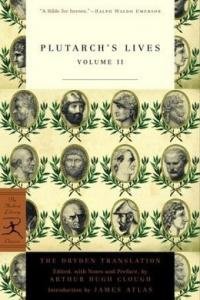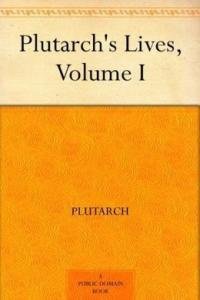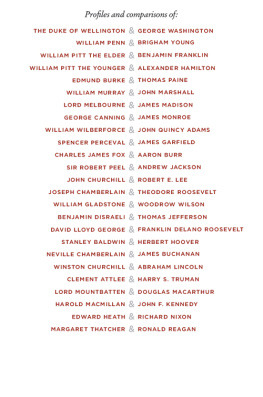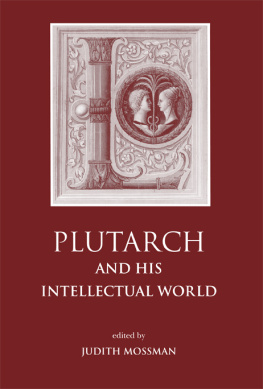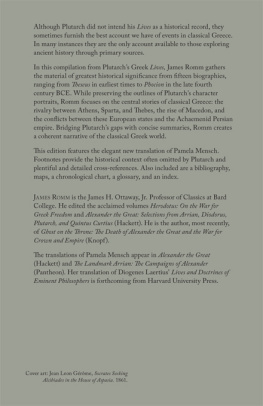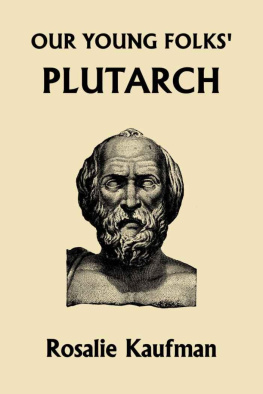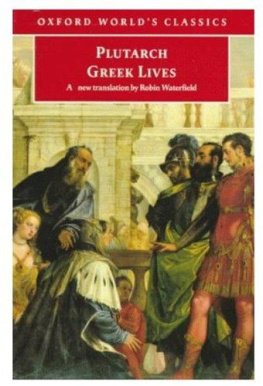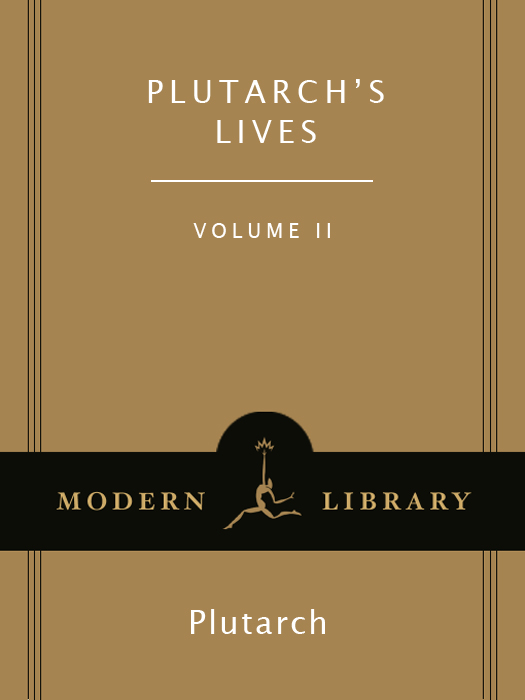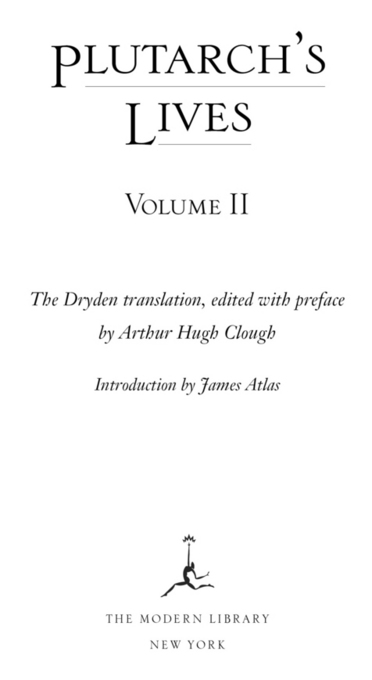2001 Modern Library Paperback Edition
Biographical note copyright 1992 by Random House, Inc.
Introduction copyright 2001 by James Atlas
All rights reserved under International and Pan-American Copyright Conventions. Published in the United States by Modern Library, an imprint of The Random House Publishing Group, a division of Random House, Inc., New York, and simultaneously in Canada by Random House of Canada Limited, Toronto.
Modern Library and colophon are registered trademarks of
Random House, Inc.
Library of Congress Cataloging-in-Publication Data
Plutarch.
[Lives. English]
Plutarchs lives / the Dryden translation, edited with notes and preface
by Arthur Hugh Clough.
v. ; cm.
eISBN: 978-0-553-89735-7
1. GreeceBiography. 2. RomeBiography. I. Dryden, John, 16311700. II. Clough, Arthur Hugh, 18191861. III. Title.
DE7.P513 2001
920.038dc21 00-068388
Modern Library website address: www.modernlibrary.com
v3.1
PLUTARCH
Plutarch was born during the reign of Claudius, around A.D . 45, at Chaeronea in Boeotia, a town of historic but somewhat faded importance. His family, originally from Thebes, had long enjoyed local distinction, a tradition he was to maintain in a life full of civic accomplishments. He founded a school of philosophy, served as Archon of Chaeronea, and eventually officiated as a priest of Apollo at Delphi. Only a few details of his life can be gleaned from his writings. At the time of Emperor Neros visit to Greece in A.D . 66, Plutarch was by his own account a student of philosophy at Athens under the teacher Ammonius. As an exponent of Platonism, he vigorously attacked the positions of the Stoics and Epicureans. He was married and had at least five children.
Plutarch spent some part of his career in Italy, although he describes his experiences there only in passing; for example, in a discussion about his knowledge of Latin writers in his life of Demosthenes, he says that having had no leisure, while I was in Rome and other parts of Italy, to exercise myself in the Roman language, on account of public business and of those who came to be instructed by me in philosophy, it was very late, and in the decline of my age, before I applied myself to the reading of Latin authors. He traveled in Egypt as well. He was a prolific writer in a variety of genres; his surviving work (representing perhaps half of what he wrote) fills a dozen volumes. In addition to the Parallel Lives of celebrated Greeks and Romans, which he produced late in his career, he wrote essays and dialogues on an immense range of subjects, collected in the Moralia. The dialoguesinvolving a cast of philosophers, grammarians, rhetoricians, and physiciansrecreate in stylized fashion the table talk, alternately moralizing and frivolous, of Plutarchs milieu. The comings and goings of these participantsfrom Britain to Tarsus, from Egypt to Lacedaemoniaemphasize that this was the heyday of Roman imperial unity, and an era of cultural flowering: Plutarchs contemporaries included Epictetus, Dio Chrysostom, Arrian, Quintilian, Tacitus, Suetonius, Pliny the Younger, Martial, and Juvenal.
Plutarchs own life may have been centered on his native town, but his writings move easily through centuries of history and across the length and breadth of the Mediterranean world. His reputation was evidently wide; under Trajan and Hadrian he is said to have received the insignia of a consul and a post as Procurator of Greece. He probably died sometime after A.D . 120. It was during the reign of Trajan that he wrote the Lives, which have proven his most enduring work. Intended as moral portraits rather than historical interpretations, the Lives are an incomparably rich trove of the facts and legends that Plutarch tirelessly collected, and an epitome of Graeco-Roman concepts of character. In the English translation made by Sir Thomas North in 1579 they contributed enormously, in both incident and language, to Shakespeares Julius Caesar, Coriolanus, and Antony and Cleopatra. The present translation, originally published in 168386 in conjunction with a life of Plutarch by John Dryden, was revised in 1864 by the poet and scholar Arthur Hugh Clough.
CONTENTS
INTRODUCTION
by James Atlas
Plutarch, the first modern biographer, chronicler of Mark Antony, Caesar, Pericles, and Brutus, is no less real to us than his mythic subjects. The known facts of his life are few, but enough to provide a vivid glimpse of him. He was born in Chaeronea, a small town in Boeotia remarkable for nothing, noted one of his translators, but the tameness and servility of its inhabitants. Even the year of his birth is uncertain: some place it near the middle of the reign of Claudius, others near the end, about 45 or 50 A.D . We know that he was Greek, and had a traditional Greek education; that he was studying philosophy under Ammonius at Athens when Nero made his incursion into Greece, in the twelfth year of the Emperors reign, the sixty-sixth year of the Christian era; and that he was from a wealthy family. His ancestors were magistrates, and were relatively long-lived. Plutarch knew his great-grandfather Nicarchus, who, we read in his life of Antony, had been whipped by Roman soldiers while forced to carry grain to the coast; and his grandfather Lamprias, fabled for his wine-induced eloquence, also makes a cameo appearance in that narrative, the source of a story about the fantastically lavish banquets Antony and Cleopatra threw for their circle of overindulgent friends, who referred to themselves as the Inimitable Livers.
Plutarchs domestic life was tranquil, by all accounts, though often darkened by the tragedy of early death, a common hazard of that era. He had at least five childrenfour sons and a daughterby his wife, Timoxena. Of his daughter, named after his wife, he wrote: When she was very young she would frequently beg of her nurse to give the breast not only to the other children, but to her babies and dolls, which she considered as her dependents, and under her protection. She died in early childhood, and he also lost two of his sons prematurely. Plutarchs response to the death of his daughter is frequently cited by scholars as a model of calm dignity in mourning. Their evidence is an essay in the form of a letter, entitled The Consolation to His Wife, that Plutarch wrote Timoxena, counseling her to grieve within the reasonable limits: What our loss really amounts to, I know and estimate for myself. But should I find your distress excessive, my trouble on your account will be greater than on that of our loss. I am not a stock or stone, as you, my partner in the care of our numerous children, every one of whom we have ourselves brought up at home, can testify. Rather than allow themselves to be overwhelmed by loss, they could more profitably recall their good fortune, however brief: Yet why should we forget the reasonings we have often addressed to others, and regard our present pain as obliterating and effacing our former joys?
Plutarch was worldly, by the standards of his day and age. In his youth he may have traveled to Egypta stage in the classical Grand Tourand also to Greece and Asia Minor. He certainly visited Italyon public business, he tells us in his life of Demosthenesbut he didnt get around to learning Latin until late in life, having had no leisure, while I was in Rome and other parts of Italy, to exercise myself in the Roman language. He delivered his public lectures on philosophy in Greek. After his Italian sojournagain, the precise dates elude historianshe retired to Chaeronea to compose his


